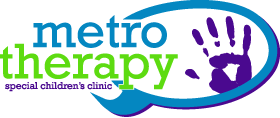Spring 2019 Newsletter
What do Speech-Language Pathologists do at Metro Therapy?
We focus on helping children of all ages develop essential communication skills. These include developing pre-linguistic skills, understanding and formulating language, producing correct speech sounds, improving speech intelligibility, using alternative and augmentative communication (AAC), developing more fluent speech, improving vocal quality and healthy voice habits, understanding and following social rules, and improving executive functions such as planning, organizing, attention, and problem solving.
What is the difference between speech and language?
Many people think of these two terms interchangeably. However, speech refers to the physical process of coordinating breathing, voicing, and movement of the lips, tongue, and jaw to produce speech sounds. Language is the rule governed symbolic system of conveying information. Sign language and writing are examples of using language without speech. Speech-language pathologists can help improve skills in both speech and language.
Developmental milestones are not the same as averages. Milestones are minimal expectations and are based on when 90% of children have achieved a skill. For example, using 50 words by 24 months is a milestone; however, an average vocabulary size for a 24 month old is 200-300 words. Listed below are approximate words in typically developing toddlers' expressive vocabularies.
Approximate Words in Expressive Vocabulary in Typically Developing Toddlers
12 months
2-6 words other than "Mama" or "Dada"
15 months
10 words
18 months
50 words
24 months
200-300 words
30 months
450 words
36 months
1,000 words
Toddlers who have typically developing skills, exceed the milestones we use for language development.
LinguiSystems Guide to Communication Milestones cites sources as:
Child Development Institute at www.childdevelopmentinfo.com. Nicolosi, Harryman, Kresheck, (2006). Owens (1996).
Other source: Laura Mize, M.S., CCC-SLP, Early Speech-Language Development: Taking Theory to the Floor, Expanded Edition.
What is Occupational Therapy?
Occupational Therapists focus on helping people engage in meaningful and purposeful activities. We look at how a person’s abilities match the activities they want or need to do, including daily living, education, work, play, and social participation. We use purposeful activities to increase performance and participation in everyday life activities. (Occupational Therapy Practice Framework, 2002)
What do occupational therapists do at Metro Therapy?
We work with infants, children, and adolescents with special needs. After an assessment of the child’s abilities in areas such as neuro-sensory processing, motor skills, psycho-social skills, self-care abilities, play skills, and/or oral motor/feeding abilities, we provide individualized treatment using therapeutic techniques appropriate for each child and consultation to parents.
What is Sensory Integration Therapy?
Sensory integration therapy uses specifically chosen childhood activities (such as swinging, jumping, coloring, and dressing) to improve how the brain processes, organizes, and responds to sensory information. These activities are designed to help your child take in sensory information (such as how they are moving, what they are touching, what they hear and see), integrate the information, and response in an adaptive or appropriate way.
Why does therapy using sensory integration work?
Brains (especially young brains) are flexible and capable of neural changes. As the brain matures some flexibility is lost. If the child is young enough to grow new connections among his neurons (under age 2), then therapy might help him do so. If the child is older, therapy appears therapy facilitate the transmission of messages from one neuron to another so that these messages flow with greater ease and efficiency.
Continuing Education
New Team Member
Taylor Nettesheim recently graduated from Herzing University from the Occupational Therapy Assistant program. She may look familiar because she completed fieldwork at Metro Therapy. “I learned so much from Kelsey and all the therapist and children at Metro. When I saw a job opening for Metro, I had to apply. Lucky for me, Veronica was willing to let me come back and work with the fantastic kids and staff at Metro. I look forward to having tons of fun and am excited to continue learning and growing with everyone at Metro Therapy.”
Veronica Clark has recently completed a degree in Speech-Language Pathology Assistant and is qualified to now see clients who require speech-language therapy. While, Veronica will not be seeing clients on a regular basis, she looks forward to filling in when needed for make-up sessions and while Brittany or Sarah are on vacation or sick.
